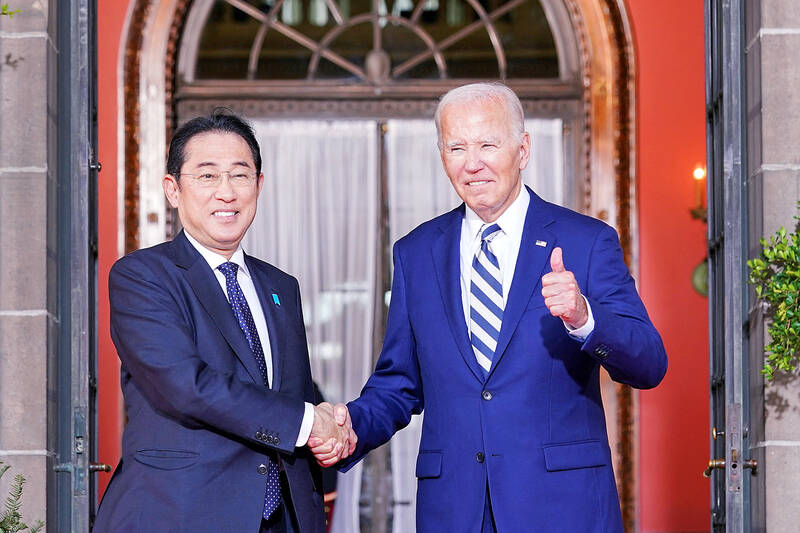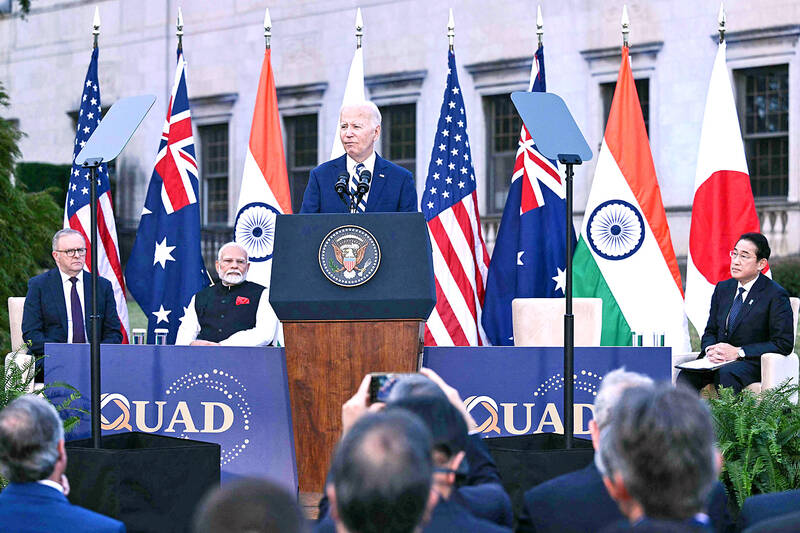US President Joe Biden and Japanese Prime Minister Kishida Fumio on Saturday reiterated their opposition to any attempt to change the “status quo” in the Taiwan Strait by force.
In a wide-ranging, one-on-one conversation on Saturday morning, the leaders “reiterated their resolve to maintain peace and stability across the Taiwan Strait” and “underscored their opposition to any attempts to change the status quo by force,” a White House news release on the meeting said.
They also “discussed their respective diplomacy with the People’s Republic of China (PRC) and their shared concerns about the PRC’s coercive and destabilizing activities, including in the South China Sea,” it said.

Photo: Reuters
In addition to discussing their dedication to developing and protecting technologies such as artificial intelligence and semiconductors, they also “committed to sustain efforts to take the US-Japan Alliance to new heights and to continue standing side-by-side together as steadfast global partners.”
The gathering was also an opportunity for them to bid each other farewell, as Biden would leave office in January, while Kishida last month announced that he would step down.
Biden on Saturday also hosted Kishida, Australian Prime Minister Anthony Albanese and Indian Prime Minister Narendra Modi in his hometown of Wilmington, Delaware, for the fourth in-person Quadrilateral Security Dialogue (Quad) leaders’ summit.

Photo: AFP
The Wilmington Declaration Joint Statement released after the summit said that they “unequivocally stand for the maintenance of peace and stability across this dynamic region, as an indispensable element of global security and prosperity.”
They also said that they “strongly oppose any destabilizing or unilateral actions that seek to change the status quo by force or coercion” and “condemn the dangerous use of coast guard and maritime militia vessels, including increasing use of dangerous maneuvers.”
In Taipei, the Ministry of Foreign Affairs yesterday expressed its gratitude to the US, Japan and like-mined countries for restating the importance of maintaining peace and stability in the Taiwan Strait and the region.
Their statements again demonstrated that the international community is highly concerned about peace and stability in the Indo-Pacific region, it said.
“As a responsible member of the Indo-Pacific, Taiwan will continue to work with like-minded partners to safeguard peace, stability, and prosperity in the Taiwan Strait and throughout the Indo-Pacific,” it added.
Meanwhile, at Saturday’s Quad meeting, Biden was caught on a hot mic telling the leaders that an aggressive China is “testing us,” in remarks that risked undercutting the summit declaration that carefully avoided mentioning Beijing by name.
“China continues to behave aggressively, testing us all across the region,” Biden was heard in what were supposed to be behind-closed-doors remarks.
Biden said that while Chinese President Xi Jinping (習近平) was focusing on “domestic economic challenges,” he was also “looking to buy himself some diplomatic space, in my view, to aggressively pursue China’s interest.”
The hot mic blunder risked undermining careful diplomatic efforts by all four countries during the summit to insist that their grouping is about more than just providing a counterweight to China.
Additional reporting by AFP

The CIA has a message for Chinese government officials worried about their place in Chinese President Xi Jinping’s (習近平) government: Come work with us. The agency released two Mandarin-language videos on social media on Thursday inviting disgruntled officials to contact the CIA. The recruitment videos posted on YouTube and X racked up more than 5 million views combined in their first day. The outreach comes as CIA Director John Ratcliffe has vowed to boost the agency’s use of intelligence from human sources and its focus on China, which has recently targeted US officials with its own espionage operations. The videos are “aimed at

STEADFAST FRIEND: The bills encourage increased Taiwan-US engagement and address China’s distortion of UN Resolution 2758 to isolate Taiwan internationally The Presidential Office yesterday thanked the US House of Representatives for unanimously passing two Taiwan-related bills highlighting its solid support for Taiwan’s democracy and global participation, and for deepening bilateral relations. One of the bills, the Taiwan Assurance Implementation Act, requires the US Department of State to periodically review its guidelines for engagement with Taiwan, and report to the US Congress on the guidelines and plans to lift self-imposed limitations on US-Taiwan engagement. The other bill is the Taiwan International Solidarity Act, which clarifies that UN Resolution 2758 does not address the issue of the representation of Taiwan or its people in

US Indo-Pacific Commander Admiral Samuel Paparo on Friday expressed concern over the rate at which China is diversifying its military exercises, the Financial Times (FT) reported on Saturday. “The rates of change on the depth and breadth of their exercises is the one non-linear effect that I’ve seen in the last year that wakes me up at night or keeps me up at night,” Paparo was quoted by FT as saying while attending the annual Sedona Forum at the McCain Institute in Arizona. Paparo also expressed concern over the speed with which China was expanding its military. While the US

SHIFT: Taiwan’s better-than-expected first-quarter GDP and signs of weakness in the US have driven global capital back to emerging markets, the central bank head said The central bank yesterday blamed market speculation for the steep rise in the local currency, and urged exporters and financial institutions to stay calm and stop panic sell-offs to avoid hurting their own profitability. The nation’s top monetary policymaker said that it would step in, if necessary, to maintain order and stability in the foreign exchange market. The remarks came as the NT dollar yesterday closed up NT$0.919 to NT$30.145 against the US dollar in Taipei trading, after rising as high as NT$29.59 in intraday trading. The local currency has surged 5.85 percent against the greenback over the past two sessions, central